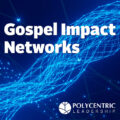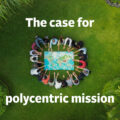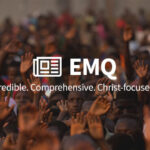GUEST POST BY BRENT FULTON
The notion of polycentric leadership has become an important topic of discussion within the global Christian community. In an era of missions “from everywhere to everywhere,” with more cross-cultural workers being sent out from non-Western countries than from traditional sending nations, it is imperative that the contributions of all be recognized and valued. Rather than assuming their long experience, carefully honed strategies, and ready resources will carry the day, leaders from traditional sending nations need to learn to listen to others at the table whose ideas may seem foreign, perhaps even misdirected, and whose available resources pale in comparison to the perceived task at hand.
Yet simply setting the table and recognizing who is seated there is only the first step. In his Christianity Today article, “Mind the Power Gap in Missions,” Josh Irby highlights the systemic imbalances that stand in the way of real collaboration. These imbalances come from centers of power that remain in the West, including money, education, institutional clout, passport privileges, language, history, and ethnic identity.
In the atmosphere of urgency that has characterized much of the past four decades of foreign Christian involvement in China, it has been easy to overlook the influence of these centers of power as organizations and churches have pushed forward to do as much as possible within what many considered to be a limited window of opportunity. In many cases these sources of power, rather than being acknowledged with caution and a healthy dose of skepticism, have instead been regarded as assets that made possible the work in China.
China’s need for more English speakers naturally played to the strengths of the church in places that could send language teachers. China’s need for economic development invited investment from wealthy nations. A church struggling to train sufficient pastors welcomed theological resources from the West.
The needy church narrative that emerged provided both the justification and the methodology for serving in China. We’re here because we’re needed. We have what it takes. The more efficiently we can meet the present need, the better. Yet this narrative inadvertently introduced several barriers to long-term collaboration.
Beyond the Quick Fix
With training materials in short supply, marriages falling apart, and churches veering off into heresy, it made perfect sense for those outside China who had experience and expertise in these areas to step in and fill the gaps. Their contributions met critical needs. For the most part, they were welcomed by a church that was struggling in so many ways.
The church did mature and become more self-sufficient over time; however, the pattern was set. The role of the church outside China was to provide what believers inside were lacking.
To quote Irby:
In mission partnerships, the higher-power partner often shares the products of their system (money, books, programs) but rarely lets the lower-power partner behind the curtain to see how the products are made.
Money is sent, but no one shares how to raise money. Books are translated, but no one shares how to write a book. One partner maintains control, and the other becomes dependent.
Some working in China have recognized this danger. They have taken steps to make the shift from meeting immediate needs to truly journeying with Chinese believers as they go through the painstaking process of discerning what God has put before them to do and how he has uniquely gifted them to serve. Making this shift requires slowing down. It requires a new mindset. It is humbling—particularly if one’s work has been seen as successful—to recognize that this assistance may not be appropriate in the long term, and that continuing to provide it may actually stand in the way of Chinese Christians coming up with something better and more sustainable.
When the outside entity’s funding becomes tied to assisting the Chinese church or serving in China in a particular way, this shift is especially difficult. As Irby writes, “The abundance of money demands an abundance of quick results…”
Institutional Imperatives
In an ideal world, organizational leaders would be able to come to the table with their Chinese peers and together discern how the Spirit is directing them to serve in unity. Yet organizational leaders carry in the back of their minds the mission and goals of their respective organizations, which, in many cases, have been crafted by boards and senior leaders thousands of miles away. If the conversation around the table resonates with—or perhaps could be steered toward—these imperatives, then partnership is possible.
This is not to detract from the importance of organizational clarity. Having a well-defined understanding of one’s own calling, capabilities, and capacity is essential for meaningful collaboration. Yet it is too easy for those who are perceived as being more knowledgeable and experienced—particularly if they’re also bringing resources to the table—to set the agenda. Others may acquiesce, not because they firmly support the mission of the foreign entity, but because of the resources on offer, whether finances, material support, training opportunities, or positional authority. In the end, both the partnership and the organization are compromised.
Bridging this disconnect seems to require elevating the table conversation and enlarging the table, temporarily putting aside pragmatic considerations of plans and budgets and bringing together Chinese partners, board members, and senior leadership to address fundamental values. Differences need to be surfaced and talked through. Expectations need to be clarified. As trust is built over time, partnership becomes possible.
Organizations may need to develop new metrics. Rather than trying to measure impact, they could ask instead how those around the table are impacting them. Who’s in the relational pipeline? How are we perceived around the table?
Owning Our Needs
Coming to the table in a spirit of generosity, those who bring knowledge and years of experience, access to financial resources, and strong institutional backing understandably want to share these gifts with others. Yet their self-perceived role may prevent them from seeing their own needs, which may be less tangible but no less significant. Equal sharing around the table means not only giving, but also humbly welcoming the unique gifts of fellow leaders whose lives can enrich one’s own.
Again quoting Irby:
Too often, we in the West define power by the ways we are powerful: money, education, passport privileges, and other resources…. But other powers are at play than those that can be measured: cross-cultural flexibility and understanding, dependence on God, willingness to suffer, and missional ingenuity.
Recognizing who is at the table requires more than acknowledging their respective roles in the task at hand. It requires seeing and appreciating them for who they really are, celebrating the work of God in their lives, and being willing to be seen by them as well. It means changing our focus from what we are trying to accomplish to how God is accomplishing his work in us.
As China’s church assumes a new role globally, these are some of the challenges that those at the table will need to address.
Dr. Brent Fulton
Founder, ChinaSource
A3 Council of Reference
More Information
- Originally published on October 29, 2024 by ChinaSource https://www.chinasource.org/resource-library/blog-entries/whos-at-the-table/
- Cover image credit: Michael Fousert via Unsplash
- Related Post: Who’s in Charge?
_________________________
 Brent Fulton is the founder of ChinaSource. Dr. Fulton served as the first president of ChinaSource until 2019. Prior to his service with ChinaSource, he served from 1995 to 2000 as the managing director of the Institute for Chinese Studies at Wheaton College. From 1987 to 1995 he served as founding US director of China Ministries International, and from 1985 to 1986 as the English publications editor for the Chinese Church Research Center in Hong Kong.
Brent Fulton is the founder of ChinaSource. Dr. Fulton served as the first president of ChinaSource until 2019. Prior to his service with ChinaSource, he served from 1995 to 2000 as the managing director of the Institute for Chinese Studies at Wheaton College. From 1987 to 1995 he served as founding US director of China Ministries International, and from 1985 to 1986 as the English publications editor for the Chinese Church Research Center in Hong Kong.
Dr. Fulton holds MA and PhD degrees in political science from the University of Southern California and a BA in radio-TV-film from Messiah College. An avid China watcher, Dr. Fulton has written and taught extensively on the church in China and on Chinese social and political phenomena. He is the author of China’s Urban Christians: A Light That Cannot Be Hidden and co-authored China’s Next Generation: New China, New Church, New World with Luis Bush.










